- Home
- Christopher Paolini
Eldest Page 6
Eldest Read online
Page 6
He breathed deeply of the cool air, listening to the hoot of an owl. A flicker of movement caught his attention. Glancing down the mountain, he saw a man approaching in the forest below. Roran ducked behind a boulder, bow drawn. He waited until he was sure it was Albriech, then whistled softly.
Albriech soon arrived at the boulder. On his back was an over-full pack, which he dropped to the ground with a grunt. “I thought I’d never find you.”
“I’m surprised you did.”
“Can’t say I enjoyed wandering through the forest after sundown. I kept expecting to walk into a bear, or worse. The Spine isn’t a fit place for men, if you ask me.”
Roran looked back out at Carvahall. “So why are they here?”
“To take you into custody. They’re willing to wait as long as they have to for you to return from ‘hunting.’”
Roran sat with a hard thump, his gut clenched with cold anticipation. “Did they give a reason? Did they mention the stone?”
Albriech shook his head. “All they would say is that it’s the king’s business. The whole day they’ve been asking questions about you and Eragon—it’s all they’re interested in.” He hesitated. “I’d stay, but they’ll notice if I am missing tomorrow. I brought plenty of food and blankets, plus some of Gertrude’s salves in case you injure yourself. You should be fine up here.”
Summoning his energy, Roran smiled. “Thanks for the help.”
“Anyone would do it,” said Albriech with an embarrassed shrug. He started to leave, then tossed over his shoulder, “By the way, the two strangers…they’re called the Ra’zac.”
SAPHIRA’S PROMISE
The morning after meeting with the Council of Elders, Eragon was cleaning and oiling Saphira’s saddle—careful not to overexert himself—when Orik came to visit. The dwarf waited until Eragon finished with a strap, then asked, “Are you better today?”
“A little.”
“Good, we all need our strength. I came partly to see to your health and also because Hrothgar wishes to speak with you, if you are free.”
Eragon gave the dwarf a wry smile. “I’m always free for him. He must know that.”
Orik laughed. “Ah, but it’s polite to ask nicely.” As Eragon put down the saddle, Saphira uncoiled from her padded corner and greeted Orik with a friendly growl. “Morning to you as well,” he said with a bow.
Orik led them through one of Tronjheim’s four main corridors, toward its central chamber and the two mirroring staircases that curved underground to the dwarf king’s throne room. Before they reached the chamber, however, he turned down a small flight of stairs. It took Eragon a moment to realize that Orik had taken a side passageway to avoid seeing the wreckage of Isidar Mithrim.
They came to a stop before the granite doors engraved with a seven-pointed crown. Seven armored dwarves on each side of the entrance pounded the floor simultaneously with the hafts of their mattocks. With the echoing thud of wood on stone, the doors swung inward.
Eragon nodded to Orik, then entered the dim room with Saphira. They advanced toward the distant throne, passing the rigid statues, hírna, of past dwarf kings. At the foot of the heavy black throne, Eragon bowed. The dwarf king inclined his silver-maned head in return, the rubies wrought into his golden helm glowing dully in the light like flecks of hot iron. Volund, the war hammer, lay across his mail-sheathed legs.
Hrothgar spoke: “Shadeslayer, welcome to my hall. You have done much since last we met. And, so it seems, I have been proved wrong about Zar’roc. Morzan’s blade will be welcome in Tronjheim so long as you bear it.”
“Thank you,” said Eragon, rising.
“Also,” rumbled the dwarf, “we wish you to keep the armor you wore in the battle of Farthen Dûr. Even now our most skilled smiths are repairing it. The dragon armor is being treated likewise, and when it is restored, Saphira may use it as long as she wishes, or until she outgrows it. This is the least we can do to show our gratitude. If it weren’t for the war with Galbatorix, there would be feasts and celebrations in your name…but those must wait until a more appropriate time.”
Voicing both his and Saphira’s sentiment, Eragon said, “You are generous beyond all expectations. We will cherish such noble gifts.”
Clearly pleased, Hrothgar nevertheless scowled, bringing his snarled eyebrows together. “We cannot linger on pleasantries, though. I am besieged by the clans with demands that I do one thing or another about Ajihad’s successor. When the Council of Elders proclaimed yesterday that they would support Nasuada, it created an uproar the likes of which I haven’t seen since I ascended to the throne. The chiefs had to decide whether to accept Nasuada or look for another candidate. Most have concluded that Nasuada should lead the Varden, but I wish to know where you stand on this, Eragon, before I lend my word to either side. The worst thing a king can do is look foolish.”
How much can we tell him? Eragon asked Saphira, thinking quickly.
He’s always treated us fairly, but we can’t know what he may have promised other people. We’d best be cautious until Nasuada actually takes power.
Very well.
“Saphira and I have agreed to help her. We won’t oppose her ascension. And”—Eragon wondered if he was going too far—“I plead that you do the same; the Varden can’t afford to fight among themselves. They need unity.”
“Oeí,” said Hrothgar, leaning back, “you speak with new authority. Your suggestion is a good one, but it will cost a question: Do you think Nasuada will be a wise leader, or are there other motives in choosing her?”
It’s a test, warned Saphira. He wants to know why we’ve backed her.
Eragon felt his lips twitch in a half-smile. “I think her wise and canny beyond her years. She will be good for the Varden.”
“And that is why you support her?”
“Yes.”
Hrothgar nodded, dipping his long, snowy beard. “That relieves me. There has been too little concern lately with what is right and good, and more about what will bring individual power. It is hard to watch such idiocy and not be angry.”
An uncomfortable silence fell between them, stifling in the long throne room. To break it, Eragon asked, “What will be done with the dragonhold? Will a new floor be laid down?”
For the first time, the king’s eyes grew mournful, deepening the surrounding lines that splayed like spokes on a wagon wheel. It was the closest Eragon had ever seen a dwarf come to weeping. “Much talk is needed before that step can be taken. It was a terrible deed, what Saphira and Arya did. Maybe necessary, but terrible. Ah, it might have been better if the Urgals had overrun us before Isidar Mithrim was ever broken. The heart of Tronjheim has been shattered, and so has ours.” Hrothgar placed his fist over his breast, then slowly unclenched his hand and reached down to grasp Volund’s leather-wrapped handle.
Saphira touched Eragon’s mind. He sensed several emotions in her, but what surprised him the most was her remorse and guilt. She truly regretted the Star Rose’s demise, despite the fact that it had been required. Little one, she said, help me. I need to speak with Hrothgar. Ask him: Do the dwarves have the ability to reconstruct Isidar Mithrim out of the shards?
As he repeated the words, Hrothgar muttered something in his own language, then said, “The skill we have, but what of it? The task would take months or years, and the end result would be a ruined mockery of the beauty that once graced Tronjheim! It is an abomination I will not sanction.”
Saphira continued to stare unblinkingly at the king. Now tell him: If Isidar Mithrim were put together again, with not one piece missing, I believe I could make it whole once more.
Eragon gaped at her, forgetting Hrothgar in his astonishment. Saphira! The energy that would require! You told me yourself that you can’t use magic at will, so what makes you sure you can do this?
I can do it if the need is great enough. It will be my gift to the dwarves. Remember Brom’s tomb; let that wash your doubt away. And close your mouth—it’s unbecoming and the
king is watching.
When Eragon conveyed Saphira’s offer, Hrothgar straightened with an exclamation. “Is it possible? Not even the elves might attempt such a feat.”
“She is confident in her abilities.”
“Then we will rebuild Isidar Mithrim, no matter if it takes a hundred years. We will assemble a frame for the gem and set each piece into its original place. Not a single chip will be forgotten. Even if we must break the larger pieces to move them, it will be done with all our skill in working stone, so that no dust or flecks are lost. You will come then, when we are finished, and heal the Star Rose.”
“We will come,” agreed Eragon, bowing.
Hrothgar smiled, and it was like the cracking of a granite wall. “Such joy you have given me, Saphira. I feel once more a reason to rule and live. If you do this, dwarves everywhere will honor your name for uncounted generations. Go now with my blessings while I spread the tidings among the clans. And do not feel bound to wait upon my announcement, for no dwarf should be denied this news; convey it to all whom you meet. May the halls echo with the jubilation of our race.”
With one more bow, Eragon and Saphira departed, leaving the dwarf king still smiling on his throne. Out of the hall, Eragon told Orik what had transpired. The dwarf immediately bent and kissed the floor before Saphira. He rose with a grin and clasped Eragon’s arm, saying, “A wonder indeed. You have given us exactly the hope we needed to combat recent events. There will be drinking tonight, I wager!”
“And tomorrow is the funeral.”
Orik sobered for a moment. “Tomorrow, yes. But until then we shall not let unhappy thoughts disturb us! Come!”
Taking Eragon’s hand, the dwarf pulled him through Tronjheim to a great feast hall where many dwarves sat at stone tables. Orik leaped onto one, scattering dishes across the floor, and in a booming voice proclaimed the news of Isidar Mithrim. Eragon was nearly deafened by the cheers and shouts that followed. Each of the dwarves insisted on coming to Saphira and kissing the floor as Orik had. When that was finished, they abandoned their food and filled their stone tankards with beer and mead.
Eragon joined the revelry with an abandon that surprised him. It helped to ease the melancholy gathered in his heart. However, he did try to resist complete debauchery, for he was conscious of the duties that awaited them the following day and he wanted to have a clear head.
Even Saphira took a sip of mead, and finding that she liked it, the dwarves rolled out a whole barrel for her. Delicately lowering her mighty jaws through the cask’s open end, she drained it with three long draughts, then tilted her head toward the ceiling and belched a giant tongue of flame. It took several minutes for Eragon to convince the dwarves that it was safe to approach her again, but once he did, they brought her another barrel—overriding the cook’s protests—and watched with amazement as she emptied it as well.
As Saphira became increasingly inebriated, her emotions and thoughts washed through Eragon with more and more force. It became difficult for him to rely upon the input of his own senses: her vision began to slip over his own, blurring movement and changing colors. Even the odors he smelled shifted at times, becoming sharper, more pungent.
The dwarves began to sing together. Weaving as she stood, Saphira hummed along, punctuating each line with a roar. Eragon opened his mouth to join in and was shocked when, instead of words, out came the snarling rasp of a dragon’s voice. That, he thought, shaking his head, is going too far…. Or am I just drunk? He decided it did not matter and proceeded to sing boisterously, dragon’s voice or not.
Dwarves continued to stream into the hall as word of Isidar Mithrim spread. Hundreds soon packed the tables, with a thick ring around Eragon and Saphira. Orik called in musicians who arranged themselves in a corner, where they pulled slipcovers of green velvet off their instruments. Soon harps, lutes, and silver flutes floated their gilded melodies over the throng.
Many hours passed before the noise and excitement began to calm. When it did, Orik once more climbed onto the table. He stood there, legs spread wide for balance, tankard in hand, ironbound cap awry, and cried, “Hear, hear! At last we have celebrated as is proper. The Urgals are gone, the Shade is dead, and we have won!” The dwarves all pounded their tables in approval. It was a good speech—short and to the point. But Orik was not finished. “To Eragon and Saphira!” he roared, lifting the tankard. This too was well received.
Eragon stood and bowed, which brought more cheers. Beside him, Saphira reared and swung a foreleg across her chest, attempting to duplicate his move. She tottered, and the dwarves, realizing their danger, scrambled away from her. They were barely in time. With a loud whoosh, Saphira fell backward, landing flat on a banquet table.
Pain shot through Eragon’s back and he collapsed insensate by her tail.
REQUIEM
“Wake, Knurlhiem! You cannot sleep now. We are needed at the gate—they won’t start without us.”
Eragon forced his eyes open, conscious of an aching head and sore body. He was lying on a cold stone table. “What?” He grimaced at the sick taste on his tongue.
Orik tugged on his brown beard. “Ajihad’s procession. We must be present for it!”
“No, what did you call me?” They were still in the banquet hall, but it was empty except for him, Orik, and Saphira, who lay on her side between two tables. She stirred and lifted her head, looking around with bleary eyes.
“Stonehead! I called you Stonehead because I’ve been trying to wake you for almost an hour.”
Eragon pushed himself upright and slid off the table. Flashes of memory from the night before jumped through his mind. Saphira, how are you? he asked, stumbling to her.
She swiveled her head, running her crimson tongue in and out over her teeth, like a cat that ate something unpleasant. Whole…I think. My left wing feels a bit strange; I think it’s the one I landed on. And my head is filled with a thousand hot arrows.
“Was anyone hurt when she fell?” asked Eragon, concerned.
A hearty chuckle exploded from the dwarf’s thick chest. “Only those who dropped off their seats from laughing so hard. A dragon getting drunk and bowing at that! I’m sure lays will be sung about it for decades.” Saphira shuffled her wings and looked away primly. “We thought it best to leave you here, since we couldn’t move you, Saphira. It upset the head cook terribly—he feared you would drink more of his best stock than the four barrels you already did.”
And you chastised me once for drinking! If I consumed four barrels, it would kill me!
That’s why you’re not a dragon.
Orik thrust a bundle of clothes into Eragon’s arms. “Here, put these on. They are more appropriate for a funeral than your own attire. But hurry, we have little time.” Eragon struggled into the items—a billowy white shirt with ties at the cuffs, a red vest decorated with gold braiding and embroidery, dark pants, shiny black boots that clacked on the floor, and a swirling cape that fastened under his throat with a studded brooch. In place of the usual plain leather band, Zar’roc was fastened to an ornate belt.
Eragon splashed his face with water and tried to arrange his hair neatly. Then Orik rushed him and Saphira out of the hall and toward Tronjheim’s south gate. “We must start from there,” he explained, moving with surprising speed on his stocky legs, “because that is where the procession with Ajihad’s body stopped three days ago. His journey to the grave cannot be interrupted, or else his spirit will find no rest.”
An odd custom, remarked Saphira.
Eragon agreed, noting a slight unsteadiness in her gait. In Carvahall, people were usually buried on their farm, or if they lived in the village, in a small graveyard. The only rituals that accompanied the process were lines recited from certain ballads and a death feast held afterward for relatives and friends. Can you make it through the whole funeral? he asked as Saphira staggered again.
She grimaced briefly. That and Nasuada’s appointment, but then I’ll need to sleep. A pox on all mead!
; Returning to his conversation with Orik, Eragon asked, “Where will Ajihad be buried?”
Orik slowed and glanced at Eragon with caution. “That has been a matter of contention among the clans. When a dwarf dies, we believe he must be sealed in stone or else he will never join his ancestors…. It is complex and I cannot say more to an outsider…but we go to great lengths to assure such a burial. Shame falls on a family or clan if they allow any of their own to lie in a lesser element.
“Under Farthen Dûr exists a chamber that is the home of all knurlan, all dwarves, who have died here. It is there Ajihad will be taken. He cannot be entombed with us, as he is human, but a hallowed alcove has been set aside for him. There the Varden may visit him without disturbing our sacred grottos, and Ajihad will receive the respect he is due.”
“Your king has done much for the Varden,” commented Eragon.
“Some think too much.”
Before the thick gate—drawn up on its hidden chains to reveal faint daylight drifting into Farthen Dûr—they found a carefully arranged column. Ajihad lay at the front, cold and pale on a white marble bier borne by six men in black armor. Upon his head was a helm strewn with precious stones. His hands were clasped beneath his collarbone, over the ivory hilt of his bare sword, which extended from underneath the shield covering his chest and legs. Silver mail, like circlets of moonbeams, weighed down his limbs and fell onto the bier.
Close behind the body stood Nasuada—grave, sable-cloaked, and strong in stature, though tears adorned her countenance. To the side was Hrothgar in dark robes; then Arya; the Council of Elders, all with suitably remorseful expressions; and finally a stream of mourners that extended a mile from Tronjheim.
Every door and archway of the four-story-high hall that led to the central chamber of Tronjheim, half a mile away, was thrown open and crowded with humans and dwarves alike. Between the gray bands of faces, the long tapestries swayed as they were brushed with hundreds of sighs and whispers when Saphira and Eragon came into view.

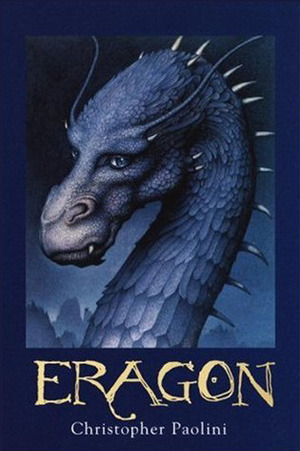 Eragon
Eragon Eldest
Eldest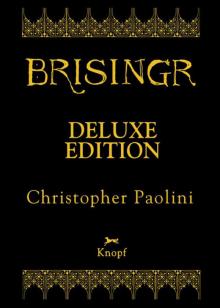 Brisingr
Brisingr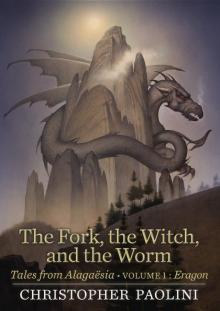 The Fork, the Witch, and the Worm
The Fork, the Witch, and the Worm To Sleep in a Sea of Stars
To Sleep in a Sea of Stars![Eldest [en] i-2 Read online](http://i1.bookreadfree.com/i/03/19/eldest_en_i-2_preview.jpg) Eldest [en] i-2
Eldest [en] i-2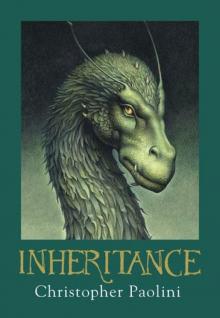 Inheritance i-4
Inheritance i-4![Brisingr [en] i-3 Read online](http://i1.bookreadfree.com/i1/03/31/brisingr_en_i-3_preview.jpg) Brisingr [en] i-3
Brisingr [en] i-3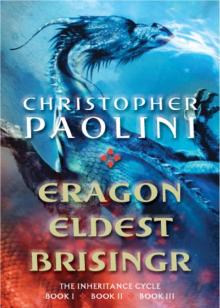 Inheritance Cycle Omnibus
Inheritance Cycle Omnibus